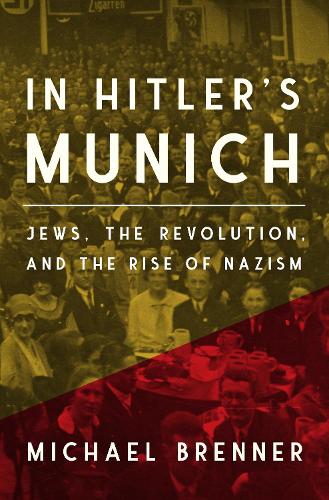
In Hitler's Munich: Jews, the Revolution, and the Rise of Nazism
(Hardback)
Available Formats
Publishing Details
In Hitler's Munich: Jews, the Revolution, and the Rise of Nazism
By (Author) Michael Brenner
Translated by Jeremiah Riemer
Princeton University Press
Princeton University Press
1st August 2022
United States
Classifications
Tertiary Education
Non Fiction
Left-of-centre democratic ideologies and movements
Far-right political ideologies and movements
943.364004924009042
Physical Properties
Hardback
392
Width 156mm, Height 235mm
Description
From acclaimed historian Michael Brenner, a mesmerizing portrait of Munich in the early years of Hitler's quest for power
In the aftermath of Germany's defeat in World War I and the failed November Revolution of 191819, the conservative government of Bavaria identified Jews with left-wing radicalism. Munich became a hotbed of right-wing extremism, with synagogues under attack and Jews physically assaulted in the streets. It was here that Adolf Hitler established the Nazi movement and developed his antisemitic ideas. Michael Brenner provides a gripping account of how Bavaria's capital city became the testing ground for Nazism and the Final Solution.
In an electrifying narrative that takes readers from Hitler's return to Munich following the armistice to his calamitous Beer Hall Putsch in 1923, Brenner demonstrates why the city's transformation is crucial for understanding the Nazi era and the tragedy of the Holocaust. Brenner describes how Hitler and his followers terrorized Munich's Jews and were aided by politicians, judges, police, and ordinary residents. He shows how the city's Jews responded to the antisemitic backlash in many different waysby declaring their loyalty to the state, by avoiding public life, or by abandoning the city altogether.
Drawing on a wealth of previously unknown documents, In Hitler's Munich reveals the untold story of how a once-cosmopolitan city became, in the words of Thomas Mann, "the city of Hitler."
Reviews
"In Hitlers Munich: Jews, the Revolution and the Rise of Nazism explores the great variety of roles played by Munichs Jews in those years, putting to rest any simple characterization of pre-World War II German Jewry."---Robert Siegel, Moment Magazine
"In his excellent new book, the noted German Jewish historian Michael Brenner explains and analyses how and why Munich became the bedrock of Nazism."---Colin Shindler, Jewish Chronicle
"Michael Brenner. . . has written a book that tells the tragic story of the city and its Jews after World War I without fear or favor and, indeed, in this particular case, without either pride or shame."---Steven E. Aschheim, Jewish Review of Books
"Brenners scholarship is rigorous and impressive. . . . [He] never lets us forget that these were people, not just figures in a historical text. . . . Although he did not intend or foresee it when he began to write, it quickly became apparent to him that what he was describing resonated uncomfortably with the events of January 6th, 2020the storming of the Capitol in Washington. At every turn the reader is reminded of the lessons of history."---Mark Welch, Jewish Book Council
"Deep, important research by a master historian." * Kirkus Reviews *
"Michael Brenner. . . provides important lessons which might help thwart the ongoing collapse of democracies across the world. . . . the book is a timely lesson on how its imperative to shake up people gullible enough to fall into the trap of manufactured lies and give their unequivocal allegiance to forces that silently work towards genocidal politics and the weakening of the fabric of constitutional democracy. As democracies are imperilled, Brenners relevant account of the anti-Semitic discourse that underpinned the early years of Hitlers quest for power becomes a wake-up call."---Shelley Walia, The Hindu
"Anyone who wants to understand the rise of the Nazis would do well to read Brenner's book."---Sabine Beppler-Spahl, Radicalism of Fools: Rethinking Anti-Semitism
Author Bio
Michael Brenner is the Seymour and Lillian Abensohn Chair in Israel Studies and director of the Center for Israel Studies at American University and professor of Jewish history and culture at Ludwig Maximilian University in Munich. His many books include In Search of Israel: The History of an Idea and A Short History of the Jews (both Princeton).
